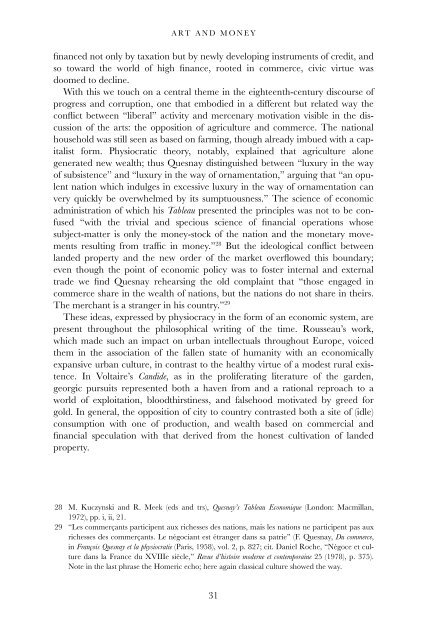Art in its Time: Theories and Practices of Modern Aesthetics
Art in its Time: Theories and Practices of Modern Aesthetics
Art in its Time: Theories and Practices of Modern Aesthetics
You also want an ePaper? Increase the reach of your titles
YUMPU automatically turns print PDFs into web optimized ePapers that Google loves.
ART AND MONEY<br />
f<strong>in</strong>anced not only by taxation but by newly develop<strong>in</strong>g <strong>in</strong>struments <strong>of</strong> credit, <strong>and</strong><br />
so toward the world <strong>of</strong> high f<strong>in</strong>ance, rooted <strong>in</strong> commerce, civic virtue was<br />
doomed to decl<strong>in</strong>e.<br />
With this we touch on a central theme <strong>in</strong> the eighteenth-century discourse <strong>of</strong><br />
progress <strong>and</strong> corruption, one that embodied <strong>in</strong> a different but related way the<br />
conflict between “liberal” activity <strong>and</strong> mercenary motivation visible <strong>in</strong> the discussion<br />
<strong>of</strong> the arts: the opposition <strong>of</strong> agriculture <strong>and</strong> commerce. The national<br />
household was still seen as based on farm<strong>in</strong>g, though already imbued with a capitalist<br />
form. Physiocratic theory, notably, expla<strong>in</strong>ed that agriculture alone<br />
generated new wealth; thus Quesnay dist<strong>in</strong>guished between “luxury <strong>in</strong> the way<br />
<strong>of</strong> subsistence” <strong>and</strong> “luxury <strong>in</strong> the way <strong>of</strong> ornamentation,” argu<strong>in</strong>g that “an opulent<br />
nation which <strong>in</strong>dulges <strong>in</strong> excessive luxury <strong>in</strong> the way <strong>of</strong> ornamentation can<br />
very quickly be overwhelmed by <strong>its</strong> sumptuousness.” The science <strong>of</strong> economic<br />
adm<strong>in</strong>istration <strong>of</strong> which his Tableau presented the pr<strong>in</strong>ciples was not to be confused<br />
“with the trivial <strong>and</strong> specious science <strong>of</strong> f<strong>in</strong>ancial operations whose<br />
subject-matter is only the money-stock <strong>of</strong> the nation <strong>and</strong> the monetary movements<br />
result<strong>in</strong>g from traffic <strong>in</strong> money.” 28 But the ideological conflict between<br />
l<strong>and</strong>ed property <strong>and</strong> the new order <strong>of</strong> the market overflowed this boundary;<br />
even though the po<strong>in</strong>t <strong>of</strong> economic policy was to foster <strong>in</strong>ternal <strong>and</strong> external<br />
trade we f<strong>in</strong>d Quesnay rehears<strong>in</strong>g the old compla<strong>in</strong>t that “those engaged <strong>in</strong><br />
commerce share <strong>in</strong> the wealth <strong>of</strong> nations, but the nations do not share <strong>in</strong> theirs.<br />
The merchant is a stranger <strong>in</strong> his country.” 29<br />
These ideas, expressed by physiocracy <strong>in</strong> the form <strong>of</strong> an economic system, are<br />
present throughout the philosophical writ<strong>in</strong>g <strong>of</strong> the time. Rousseau’s work,<br />
which made such an impact on urban <strong>in</strong>tellectuals throughout Europe, voiced<br />
them <strong>in</strong> the association <strong>of</strong> the fallen state <strong>of</strong> humanity with an economically<br />
expansive urban culture, <strong>in</strong> contrast to the healthy virtue <strong>of</strong> a modest rural existence.<br />
In Voltaire’s C<strong>and</strong>ide, as <strong>in</strong> the proliferat<strong>in</strong>g literature <strong>of</strong> the garden,<br />
georgic pursu<strong>its</strong> represented both a haven from <strong>and</strong> a rational reproach to a<br />
world <strong>of</strong> exploitation, bloodthirst<strong>in</strong>ess, <strong>and</strong> falsehood motivated by greed for<br />
gold. In general, the opposition <strong>of</strong> city to country contrasted both a site <strong>of</strong> (idle)<br />
consumption with one <strong>of</strong> production, <strong>and</strong> wealth based on commercial <strong>and</strong><br />
f<strong>in</strong>ancial speculation with that derived from the honest cultivation <strong>of</strong> l<strong>and</strong>ed<br />
property.<br />
28 M. Kuczynski <strong>and</strong> R. Meek (eds <strong>and</strong> trs), Quesnay’s Tableau Economique (London: Macmillan,<br />
1972), pp. i, ii, 21.<br />
29 “Les commerçants participent aux richesses des nations, mais les nations ne participent pas aux<br />
richesses des commerçants. Le négociant est étranger dans sa patrie” (F. Quesnay, Du commerce,<br />
<strong>in</strong> François Quesnay et la physiocratie (Paris, 1958), vol. 2, p. 827; cit. Daniel Roche, “Négoce et culture<br />
dans la France du XVIIIe siècle,” Revue d’histoire moderne et contempora<strong>in</strong>e 25 (1978), p. 375).<br />
Note <strong>in</strong> the last phrase the Homeric echo; here aga<strong>in</strong> classical culture showed the way.<br />
31
















